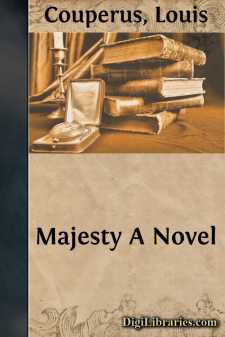Categories
- Antiques & Collectibles 13
- Architecture 36
- Art 48
- Bibles 22
- Biography & Autobiography 813
- Body, Mind & Spirit 142
- Business & Economics 28
- Children's Books 17
- Children's Fiction 14
- Computers 4
- Cooking 94
- Crafts & Hobbies 4
- Drama 346
- Education 46
- Family & Relationships 57
- Fiction 11829
- Games 19
- Gardening 17
- Health & Fitness 34
- History 1377
- House & Home 1
- Humor 147
- Juvenile Fiction 1873
- Juvenile Nonfiction 202
- Language Arts & Disciplines 88
- Law 16
- Literary Collections 686
- Literary Criticism 179
- Mathematics 13
- Medical 41
- Music 40
- Nature 179
- Non-Classifiable 1768
- Performing Arts 7
- Periodicals 1453
- Philosophy 64
- Photography 2
- Poetry 896
- Political Science 203
- Psychology 42
- Reference 154
- Religion 513
- Science 126
- Self-Help 84
- Social Science 81
- Sports & Recreation 34
- Study Aids 3
- Technology & Engineering 59
- Transportation 23
- Travel 463
- True Crime 29
Majesty A Novel
by: Louis Couperus
Description:
Excerpt
The betting-book in one of London's oldest and most famous clubs contains a wager, with odds laid at one hundred sovereigns to ten, that "within five years there will not remain two crowned heads in Europe." The condition—"in the event of war between Great Britain and Germany"—was imposed by the date of the wager, for one member was venturing his hundred to ten at a moment when another was dining with him to kill time before the British prime minister's ultimatum took effect: the imperial German government had to deliver its reply before midnight, by Greenwich time, or eleven o'clock, by Central European reckoning.
Since the fourth of August, 1914, the King of the Hellenes, the Czar of Bulgaria, the Emperor-King of Austria-Hungary, the German Kaiser and a host of smaller princes have abdicated and sought asylum in countries left neutral by the war; the Czar of All the Russias also abdicated, but was executed without an opportunity of escape. Thus, though republican and royalist may protest that the wager was too sanguine or too pessimistic, the challenger must have taken credit for his prescience, as three of the great powers and two of the lesser converted, one after another, their half-divine sovereign into their wholly material scapegoat; by no great special pleading he might claim that the bet was won in spirit if not in fact when the morning of Armistice Day shewed monarchy surviving only in Spain, Italy, Roumania and Greece, in the small liberal kingdoms of Scandinavia and the Netherlands, in the minute principality of Monaco, in the crowned republic of Great Britain and Ireland and in the eternal anachronism of the Ottoman Empire. And the time-limit of five years had been exceeded by only three months.
In the peaceful period, four times longer, between the publication of Majesty in 1894 and the outbreak of the Great War, historians were kept hardly less busy with their record of fallen monarchs and extinguished dynasties: King Humbert of Italy was assassinated in 1900; King Alexander of Servia, with his queen, in 1903; King Carlos of Portugal, with the heir-apparent, in 1908; and the Sultan Abdul Hamid was deposed and imprisoned in 1909. Before the year 1894 no ruler of note had removed himself or been removed since the assassination of the Czar Alexander II in 1881; this study of "majesty" in its strength and, still more, in its weakness was published at a time when even the autocrat was more secure on his throne than at any period since "the year of revolution," 1848.
If Majesty is to be regarded as a roman à clef, there is a temptation, after six and twenty years, to call Couperus 'prophetic:' to call him that and nothing else is to turn blind eyes to the intuitive understanding which is more precious than divination, to ignore, in one book, the insight which illumines all and to overlook the quality which, among all the chronicles of kings, penetrates beyond romance and makes of Majesty an essay in human psychology. So long as the fairy-tales of childhood are woven about handsome princes and the fair-haired daughters of kings, there is no danger that the setting of royalty will ever lose its glamour; so long as "romantic" means primarily that which is "strange," the writer of romance may bind his spell on all to whom kings' houses and queens' gardens are an unfamiliar world; so long as the picturesque and traditional hold sway, the sanction and titles of kingship, the dignities and the procedure, the inhibitions and aloofness of royalty will fascinate, whether they like it or not, all those in whose veins there is no "golden drop" of blood royal....





